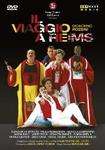|
Back
05/05/2011
Gioachino Rossini: Il viaggio a Reims
Elena de la Merced (Corinna), Paula Rasmussen (La Marchesa Melibea), Mariola Cantarero (La Comtessa di Folleville), Maria Bayo (Madama Cortese), Josep Bros (Il Cavaliere Belfiore), Kenneth Tarver (Il Conte de Libenskof), Simón Orfila (Lord Sidney), Nicola Ulivieri (Don Profondo), Enzo Dara (Il Barone di Trombonok), Àngel Òdena (Don Alvaro), Stephen Morscheck ((Don Prudenzio), Josep Ruiz (Don Luigino), Claudia Schneider (Delia), Mireia Pintó (Maddalena), Mercè Obiol (Modestina), David Alegret (Zefirino), Alex Sanmarti (Antonio), Jordi Casanova (Gelsomino), The Symphony Orchestra and Chorus of the Gran Teatre del Liceu, William Spaulding (Chorus Master), Jesús López-Cobos (Conductor), Sergi Belbel (Stage Director), Estel Cristià, Max Glaenzel (Set Designers), Javier Artiñano (Costume Designer), Keith Morino (Choreographer), Albert Faura (Lighting Designer), Toni Bargalló (Video Director)
Recorded live at Gran Teatre del Liceu, Barcelona (March 2003) – 164’
ARTHAUS MUSIK Ref. #: NTSC 107135 – Picture Format: 16:9 – Sound Format: Dolby Digital 5.1 – Subtitles in English, German, French, Spanish, Italian, and Catalan

Rossini’s Il viaggio a Reims ossia l’Albergo del Giglio d’Oro (The Journey to Reims or The Hotel of the Golden Fleur-de-Lis), is merely a pièce de circonstance commissioned in 1825 to celebrate the anointment of Charles X of France in the Reims cathedral. Rossini, who abundantly plagiarized himself throughout his career only authorized the performance of this drama giocoso a few times, so as to be free to re-use the music in Le Comte Ory three years later. The opera fell into oblivion for almost two hundred years until it was resurrected by The Rossini Opera Festival in 1984 in a staging by Luca Ronconi with a starry cast. Since then, Il viaggio a Reims has made its entry into most major – and not so major – operatic venues.
Given the extreme difficulty to mount a work that requires the services of ten world-class soloists, this Gran Teatre del Liceu’s 2003 production is worthy of praise, at least on a musical standpoint. Tenor Kenneth Tarver as Count Libenskof and Paula Rasmussen as Marchesa Melibea are both dazzling in their duet. Soprano Elena de la Merced, in the part of Corina, is commendable in her two arias “Arpa gentil” and “All’ombra almena”, while Josep Bros, with his high tenor line, does justice to the part of Belfiore. Nicola Ulivieri is irresistible in his Don Profondo’s comic aria “Medaglie incomparabili”. The omni-present-in-Rossini-opera Enzo Dara, who was already in the 1984 Pesaro cast, still uses his bass-baritone with agility, style, and wit. All cast members are simply spectacular in the 14-singer ensemble of scene nineteen. Conductor Jesús López-Cobos pens a flexible, alert, and vibrant rendition of this bubbly and comic gem.
The undeniable disappointment in this production comes from the staging. Attempting to graft “big thoughts” onto a thin plot (by projecting slides of military scenes, people behind barbed-wires, the Vietnam war, Picasso’s Guernica, Stalin, Hitler, Princess Di, and George W. Bush), director Sergi Belbel, fails to see that Rossini’s point was, with biting irony and uncompromising humor, to ridicule the decadent Old Regime and ruling class. Such sententious hodgepodge of references to contemporary history is purely irrelevant and out of place.
Listen to scene 19’s finale
Christian Dalzon
|